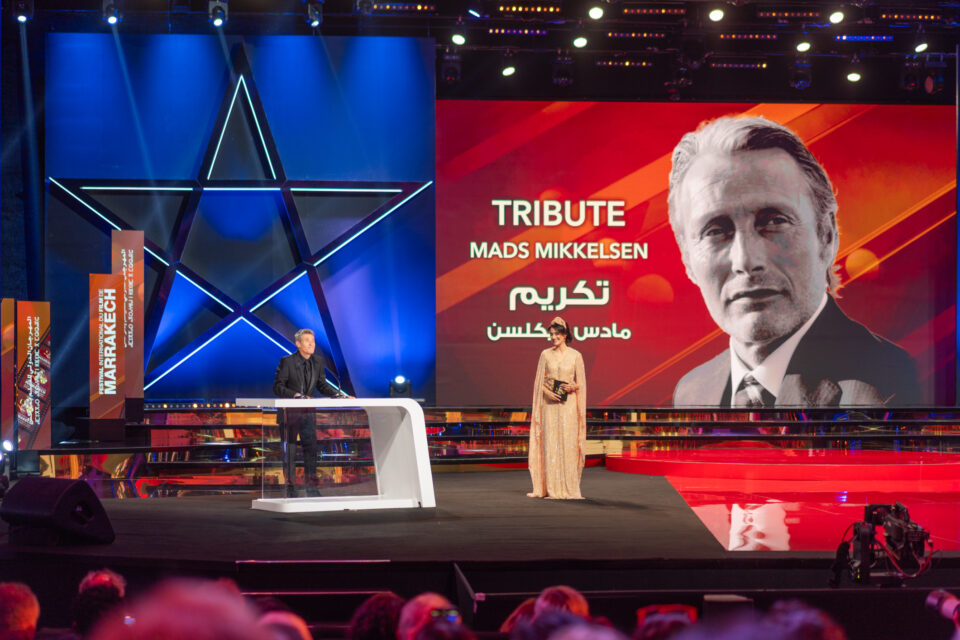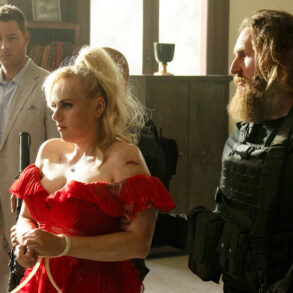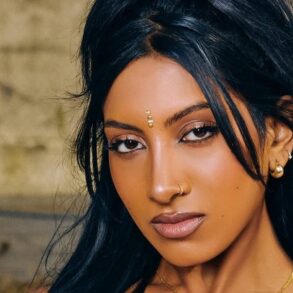The first thing Mads Mikkelsen notices as he sits down to begin a conversation with a group of journalists at the Marrakech International Film Festival is the ‘slashed O’. A vowel in the Danish alphabet that comes after Z, he notices it in the brand name of one of the recorders placed in front of him.
“That is a Danish letter,” he says, explaining what the word means in his native language (Rode with a ‘slashed O’ means red). Dressed in a suede brown jacket, he looks around the table and says, “Hello everyone. Do you mind?” pointing to his cigarette packet lying on the table.
No one sitting around two square marble tables, that have been pushed together in the cozy little, gravelly courtyard of the 100-year-old La Mamounia hotel, minds.
“Good,” he says, ending the word with a gentle T instead of D, lights his cigarette, blows the smoke up and away and begins answering questions that have been put to him over and over by journalists and fans in an attempt to understand where Mikkelsen, who straddles the two distinct worlds of European art house cinema and big Hollywood franchise films with fascinating ease, gets his acting mojo from.
“It’s the script,” he says.
Mikkelsen studies film scripts carefully to understand the story, but also to figure out why his character is acting the way he is and to find “the emotion that is propelling him.” Once he knows what that is, he talks to the director, comes up with ideas about how to make that emotion stronger, “more brutal,” and to do that, he says, he’s willing “to do whatever whatever it takes.” Including “throwing things away from myself. Me.”
“We all have all emotions, they might be small or big, depending on our personality… So I have to find a couple of things characteristic of this character. Identify them in me, make them much bigger in me and throw out some of my own things.”
As Lucas, the kindergarten teacher Mikkelsen played in Danish director Thomas Vinterburg’s 2012 film, The Hunt, that critical emotion he kept building on was reticent belief. His Lucas was sure that people around him — his friends and colleagues — would see the absurdity of the allegation of sexual abuse that had been thrown at him.
“It was a frustrating film to watch because he [Lucas] is a man who believes that justice will be served because he didn’t do anything. So he takes it the mild way… then it goes too far and he can’t get out of it, the doors are shutting and he [still] doesn’t react,” says Mikkelsen.
Mikkelsen, 58, who made his debut with the 1996 Danish crime thriller Pusher, is best known for his sublime performance as Lucas in the film festival circuit, but worldwide his calling card is the chilling terrorist financier, Le Chiffre, he played in Casino Royale.
The Hunt won him awards, including at Cannes, and his performance in the 2006 James Bond film turned him into Hollywood’s go-to-guy for glassy-eyed continental villainy. Since then, he has played the evil guy in Doctor Strange, Star Wars, Fantastic Beasts, Indiana Jones as well as Hannibal in the NBC television series.
“It’s the funny accent… It used to be Germans, then it was Brits, then the Russians, and then for some reason they fell in love with the Danish accent,” Mikkelsen said during a masterclass at the nine-day Marrakech International Film Festival in response to a question about why he gets to play only baddies in Hollywood films.
“Is it just the accent?” I asked him at the round table.
“No, no. It’s not just the accent,” he said.
“What Americans like, they tend to want more of that (rubs his fingers together to articulate ‘that’)… And fair enough. If that’s what I get offered, I’m fine,” he said.
‘Life’s come full circle’
Mikkelsen says he feels “super privileged” that he gets to play “grotesquely evil, insane” characters and act in European kitchen sink dramas, but “more and more,” he adds, it’s “become important to me to do Danish films, European films.”
“Not just because it’s my home, it’s my language, it’s my stories,” but also because when he is working with friends, he can go a little further, experiment, break boundaries which, he says, he wouldn’t do with “someone I didn’t know.”
In preparation for Vinterberg’s 2020 film, Another Round (titled Druk in Danish, which means binge drinking), Mikkelsen and the film’s three other main actors participated in a boot camp where they experimented with levels of alcohol by drinking and then acting out, repeatedly, one particular scene.

After a certain amount of alcohol, Mikkelsen has said elsewhere, it became clear that there was no communication with the director at all. “It was [like] four kids talking and nobody listening.” And then there were the hands which, he said, “get their own life after, let’s say, four beers.”
Another Round won an Oscar for the best international feature. And on Friday evening, at the Marrakech Film Festival’s opening, when Mikkelsen arrived on stage to receive the honorary Etoile d’Or career prize from American actor Willem Dafoe, Another Round‘s now famous song, “What A Life,” played.
In the film’s climactic sequence, Mikkelsen, a trained ballet dancer, dances to this song. And he did a cool, elegant jig on stage as well.
“The man who sang that song [Emil Goll of the band Scarlet Pleasure]… he was a friend of my daughter’s when he was young… And I must have driven him home at least three times, super-drunk. And [now] he’s made this song about alcohol that has become my anthem,” Mikkelsen said.
“Life’s come full circle.”
‘Characters without humanity are cartoons’
In his acceptance speech for the honorary award, Mikkelsen spoke of meeting his hero, Martin Scorsese, years ago at the Marrakech Film Festival and talked about the film that he says has influenced him the most — Taxi Driver.
At the roundtable, he explained why.
“[Travis Bickle] is not a likable character, but there’s something about him that De Niro makes me feel — if not sympathy, then at least he makes me want to go on the journey with him.”
That special something, he says, is humanity, and that’s what he tries to give to all his characters.
Though Mikkelsen has famously played the villain in many big-budget Hollywood films, he is a Dane first and a European who likes to view the world, people and their stories with their inherent complexity, and likes to add grey shades to the characters he plays.



“Humans are not black or white. Obviously, the world is increasingly turning into ‘with us’ or ‘against us’… But somewhere in the middle there is a discussion to be had… About whatever subject you want, there is a discussion in the middle that is a sensible discussion. But no side, doesn’t matter what the subject is, wants that. They just want this or that… Life really is not like that,” he said.
So he looks for “flaws in the heroes,” and searches for “a couple of places where the baddie has a point” and he becomes human as well. “If not, we are just watching cartoons.”
“The more humanity we can give the characters, the more we enjoy the battle… And that’s a much better way of telling stories that are human and not just political statements,” he said.
Despite his investment in the roles he plays and intense performances, Mikkelsen doesn’t carry his characters home.
“I do not insist on my kids calling me different names. It’s not going to happen,” he says with certitude.
“I think it’s wrong. You can find actors who do that and some are very good, [but] that is not the magic thing,” he says and adds that it’s basically “crap” that tends to impress people, “especially journalists.”
“‘Oh, so he lived on a mountain for two years, didn’t talk to his kids, he is so dedicated.’ Yeah, but what if he’s a shit actor?”
The 20-minute roundtable with Mads — which I learned later from Google is pronounced ‘mass’ and means ‘gift of God’ — is over and the PR lady is waving at the journalists to stop. Usually, that’s a cue for some journalists to ask one quick question, and often it’s the one they were told by the PR not to ask.
With Mads Mikkelsen it’s about the ongoing crisis in the Middle East.
“Not today,” he says, matter of factly.
Because today, there is no middle.
* The Marrakech International Film Festival runs from Nov. 24 to Dec. 2
This post was originally published on this site be sure to check out more of their content.








